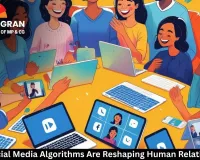Has Digital Connectivity Killed Real Conversations?
Digital Desk

The Profound Impact of Emerging Social Media Platforms on Personal and Public Interactions.
In an era where digital connectivity reigns supreme, emerging social media platforms have revolutionized how we engage with one another. From TikTok's short-form videos to Instagram's curated feeds, these tools promise instant connection but often at the cost of authentic human interaction. As someone who's witnessed the shift from face-to-face conversations to endless scrolling, I argue that while social media enhances accessibility, it has eroded the depth of personal relationships and reshaped public discourse in troubling ways.
The Erosion of Personal Connections
Social media's rise has undeniably transformed personal interactions. Platforms like Facebook and Snapchat allow us to stay in touch with friends across continents, sharing life's moments in real-time. However, this convenience comes with a downside. Studies show that excessive use leads to "phubbing"—ignoring people in favor of phones—diminishing the quality of in-person encounters. In my view, we've traded meaningful dialogues for superficial likes and emojis. Remember the joy of unplanned coffee chats? Now, they're often preempted by DMs that lack nuance, fostering isolation despite being "connected."
Moreover, algorithms prioritize engagement over empathy, creating echo chambers where users interact only with like-minded individuals. This has implications for mental health; young adults report higher anxiety from constant comparison. The impact of social media on personal relationships is stark: divorces citing platform-induced jealousy are on the rise, and families lament screen time over dinner table talks. As an observer, I believe reclaiming personal bonds requires intentional offline efforts, like digital detoxes, to restore genuine intimacy.
Reshaping Public Interactions and Civic Engagement
On a broader scale, social media's effect on public interactions is even more profound. Platforms such as Twitter (now X) and Reddit have democratized information, enabling global movements like #MeToo or climate strikes. They amplify marginalized voices, fostering public discourse that traditional media might overlook. Yet, this openness breeds toxicity. Fake news spreads virally, polarizing societies and eroding trust in institutions.
In public spheres, interactions have become performative. Politicians tweet policies instead of debating in town halls, reducing complex issues to 280 characters. Cyberbullying and cancel culture stifle free expression, turning public engagement into a minefield. From my perspective, this shift undermines democratic processes; elections are influenced by viral memes rather than informed debates. The digital divide exacerbates inequalities—those without access miss out on public conversations, widening societal gaps.
Balancing Innovation with Human Needs
Despite these challenges, emerging platforms offer innovative solutions. Features like live streaming on YouTube or virtual reality meetups on Meta's Horizon Worlds bridge physical distances, especially post-pandemic. They facilitate hybrid interactions, blending online and offline worlds. However, the key lies in mindful usage. Governments and tech companies must prioritize ethical design, such as algorithm transparency and anti-harassment tools, to mitigate negative effects.
In conclusion, the impact of digital social media platforms on live personal and public interactions is a double-edged sword. They've expanded our reach but diluted authenticity. As we navigate this landscape, prioritizing real-world connections over digital facades is essential. By fostering awareness, we can harness these tools for good without sacrificing our humanity.


2.jpg)
.jpg)
.jpg)
2.jpg)
2.jpg)
2.jpg)
2.jpg)
2.jpg)
1.jpg)
